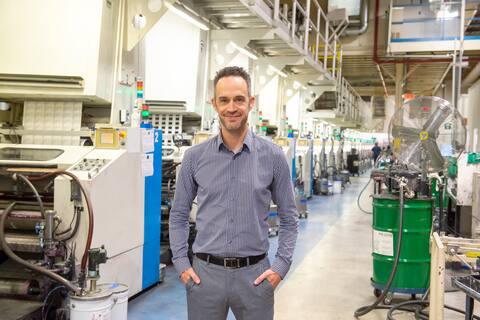The pride of the 258 employees of the little-known factory in Montreal’s Hochelaga-Maisonneuve is now on the upswing, while their employer has reclaimed Loto-Québec’s title of “major shareholder.”
“We couldn’t be happier. We did everything we could to achieve this, and it was a success for us,” Marc-André Doyen, the country’s vice president of scientific games, said with relief during our visit.
Founded a few hundred meters east of the Olympic Stadium, the American company is not used to attracting attention. However, attention returned in 2014 after Lotto-Quebec decided to use its Manitoba competitor (Pollard Banknote) to produce more than 80% of its instant games.
This first $38 million contract with Pollard was renewed twice (in 2019 and 2021) until the US team regained support with the state-owned company. The contract, of confidential value, covers a period of five years.
Maximum security
The Montreal plant, one of five American-owned in the world, is undoubtedly one of the safest in the province. Not just anyone can enter, and some rare authorized visitors must submit to security measures reminiscent of border services at airports.
“When you think about it, our work is comparable to those who print money,” said Mr. Doyan explains. Government agencies everywhere outsource the printing of their lottery tickets to us; Our mission is to fulfill this mandate while respecting the highest standards. We must be infallible, there is no room for error. »
The 11,000 square foot factory never sleeps. Some forty gaming companies around the world (Australia, USA, France, Hungary, etc.) have their presses “running” continuously, 24 hours a day, 51 weeks a year, with more than 20 million scratch game tickets per day. .). Until recently, 90% of its production was exported.
Return to Montreal
Things may change as Loto-Québec is repatriating much of its production of scratch cards from Winnipeg to a plant on Boulevard de l’Assomption in Montreal. Ultimately, at least 20% of its operations should be dedicated to it.
The employer is discreet about the terms of the proposal, which would allow her to recover the contract she escaped. No promises of employment or investment were required, he swears.
Yet its last major investment ($20 million) was in the purchase of a new 70-meter-long press—the true central nervous system of the establishment—a dozen years ago.
Innovation and ecology
The company says it invests hundreds of thousands annually in research and development, which has allowed it to design tickets made from recycled paper, among other things.
“Like us, Loto-Québec is recognized as a flagship company that wants to be innovative by offering new products. This is a perfect fit for us,” explains the vice-president.
“Because we can create new ideas, it’s useless if no customer dares to try it. As they say, it takes two to dance. And Loto-Québec is definitely our favorite dance partner. »
Science games around the world
Employees: 3000
Head office: Atlanta (Georgia)
Manufacturing Units: Five (Canada, Chile, China, United States, Great Britain)
customers: 130 lottery companies from 50 countries.
Opportunity: 70% of the retail sales of lottery games in the world are produced by this company
Science Games in Montreal
Employees: 258
Hours: 24 hours a day
Annual Production: 8 billion rupee notes (standard 2X4 inch units)
“Alcohol evangelist. Devoted twitter guru. Lifelong coffee expert. Music nerd.”
 The Press Stories
The Press Stories


